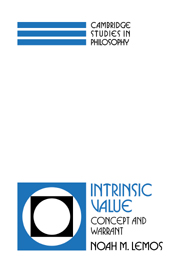Book contents
- Frontmatter
- Contents
- Preface
- Acknowledgments
- Part I Value, plurality, parts, and wholes
- 1 The concept of intrinsic value
- 2 The bearers of intrinsic value
- 3 Organic unities and the principle of universality
- 4 Higher goods and the myth of Tithonus
- 5 Pleasure and its intrinsic value
- 6 Consciousness, knowledge, and the consciousness thesis
- Part II Naturalism, nonnaturalism, and warrant
- Appendix A Chisholm's definition of organic unity
- Appendix B Some naturalistic analyses
- Selected bibliography
- Index
3 - Organic unities and the principle of universality
Published online by Cambridge University Press: 07 May 2010
- Frontmatter
- Contents
- Preface
- Acknowledgments
- Part I Value, plurality, parts, and wholes
- 1 The concept of intrinsic value
- 2 The bearers of intrinsic value
- 3 Organic unities and the principle of universality
- 4 Higher goods and the myth of Tithonus
- 5 Pleasure and its intrinsic value
- 6 Consciousness, knowledge, and the consciousness thesis
- Part II Naturalism, nonnaturalism, and warrant
- Appendix A Chisholm's definition of organic unity
- Appendix B Some naturalistic analyses
- Selected bibliography
- Index
Summary
In Book X of the Nicomachean Ethics, Aristotle refers to a kind of argument intended to show that pleasure is not the only intrinsic good:
Plato uses a similar argument in his refutation that pleasure is the good; a pleasant life, he says, is the more desirable when combined with practical wisdom than without it; but if pleasure is better in combination with something else, it is not the good, since the good cannot become more desirable by the addition of something to it.
The argument presupposes the general principle that if a whole consisting in A and B is intrinsically better than its part A, then B must also be intrinsically good. Given this assumption, one may argue that since the whole consisting in pleasure and practical wisdom is better than pleasure alone, it follows that practical wisdom must also be intrinsically good and that pleasure is not the sole intrinsic good. The principle presupposed in this argument seems initially plausible, for it seems plausible to think that if a whole is better than one of its parts, then its greater value must be due to the presence of another good part. The assumption on which this argument rests implicitly denies what Moore called the “principle of organic unities.”
In Principia Ethica, Moore states and accepts two principles concerning intrinsic value. These are the principle of organic unities and the thesis of universality. According to the principle of organic unities, “the value of a whole must not be assumed to be the same as the sum of the values of its parts.” We may understand the principle of organic unities to tell us that the value of some wholes is not the same as the sum of the values of their parts.
- Type
- Chapter
- Information
- Intrinsic ValueConcept and Warrant, pp. 32 - 47Publisher: Cambridge University PressPrint publication year: 1994



